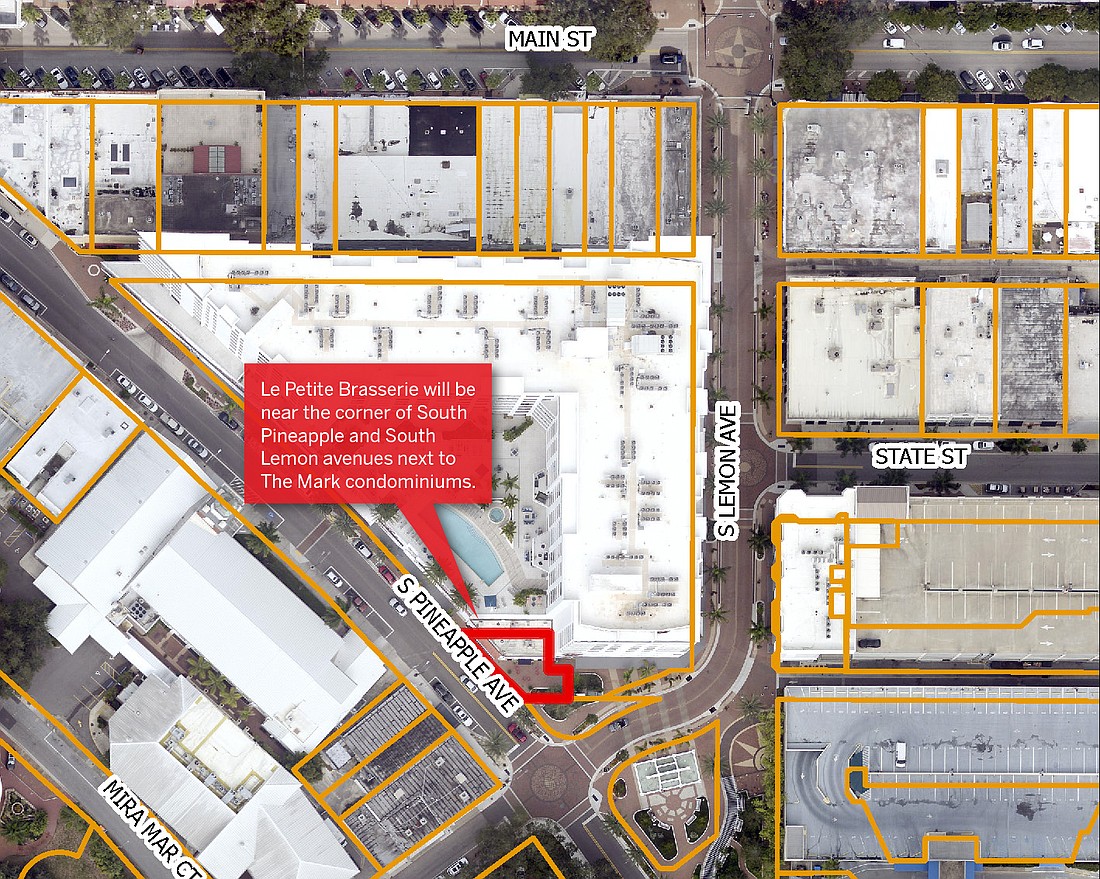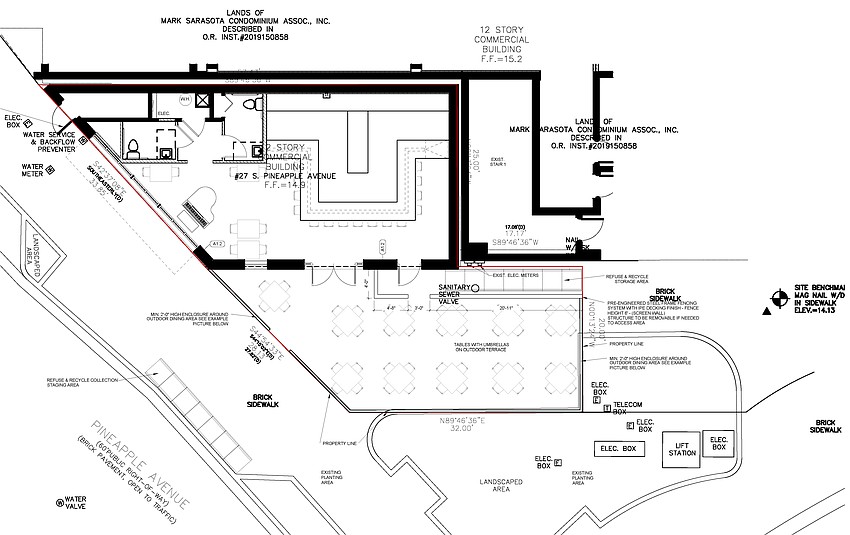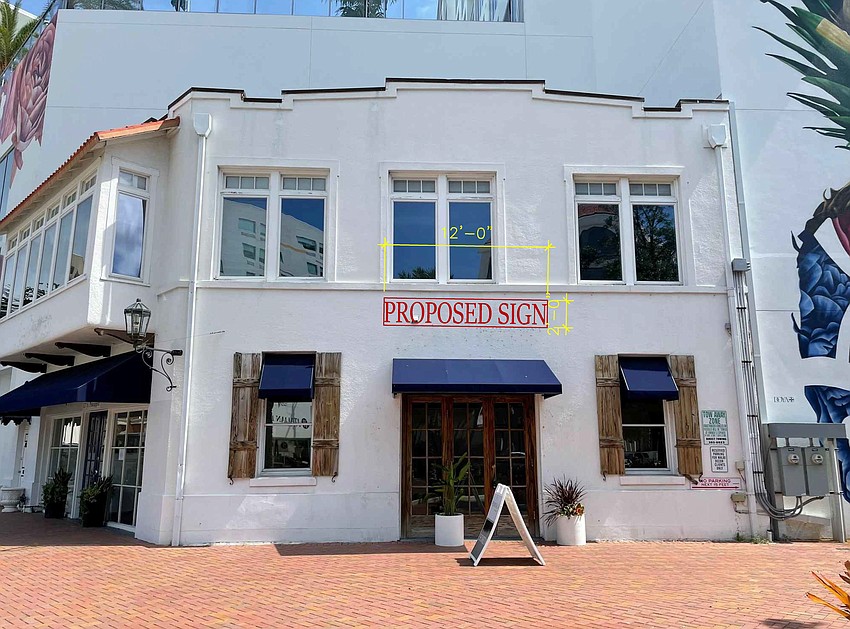- July 11, 2025
-
-
Loading

Loading
 Courtesy image
Courtesy image
Translated literally, Le Petite Brasserie means “the little restaurant.”
The path to city approval for the diminutive 1,200-square-foot piano bar/eatery at 127 S. Pineapple Ave., the corner of South Pineapple and South Lemon avenues, followed an enormous debate Tuesday before the City Commission as nearly two dozen residents of The Mark condominiums spoke in support of and opposition to the proposal.
After three hours of talk interrupted by a lunch break, commissioners approved applications for a major conditional use permit and site plan approval by a 4-1 vote with Jen Ahearn-Koch opposed.
At the heart of the opposition was whether Le Petite Brasserie is a restaurant at all. With no on-site kitchen, the establishment cannot be categorized by city code as a restaurant. It will serve food prepared in a commissary kitchen but plated behind the bar. Because it will include outdoor seating, it also could not legally operate as a bar. That leaves it in the category of a nightclub — a misnomer of sorts, argued consultant Joel Freedman, for it will not operate as a typical nightclub.
The piano will be located inside the building with amplification provided only for the singer, Freedman said. The patio seating will close at 11 p.m. weeknights and at midnight on weekends.

Still, the term “nightclub” leaves residents of The Mark anxious, particularly those whose condos are located directly above what is now a boarded up storefront, one of the commercial spaces in The Mark owned by Ronnie Shugar.
Opponents charged approval of the business would violate the city’s zoning rules, which some commissioners and City Attorney Robert Fournier countered are flexible when it comes to exemptions in the Downtown Core district. Mostly, opponents cited the proximity directly across the street from First United Methodist Church, which is prohibited by the zoning code that requires a 500-foot separation between a nightclub and a church or school.
The church, though, does not oppose the project. And, Shugar and Freedman argued, Le Petite Brasserie is a nightclub only because it can’t be classified as anything else.
Shugar is planning an upscale cocktail lounge evoking the flair of a European sidewalk cafe. It requires a 4-COP liquor license to operate, qualifying it as a nightclub use, which is defined by the zoning code as “any restaurant, dining room, bar or similar establishment providing food or refreshments, which holds a 4-COP liquor license from the State Department of Business Regulation, Division of Alcoholic Beverages and Tobacco.”
“As I sat on the bench on the corner, I envisioned the Champs Élysées in France or the streets of Milan,” Shugar said of the space. “People could just enjoy that beautiful scenery and beautiful building and, as an upscale brasserie, a place where mature adults could go to have a drink of champagne, hors d'oeuvres and just enjoy the beauty and surroundings.”

Opponents who reside in The Mark, though, weren’t in such a Paris state of mind as they likened a “nightclub” to the considerably more intense nightlife on the opposite side of The Mark, specifically citing The Gator Club.
Although he insisted Le Petite will be nothing like the activity on the Main Street side of the building, Shugar cited documents signed by residents as they purchased their units that indemnify street-level commercial uses.
“Under nuisances I'll read, and I quote, ‘Each unit owner by acceptance of a deed or otherwise acquiring title to a unit shall be deemed to understand and agree that if restaurants, cafes, bakeries or other food service operations are operated from the commercial units, such operations may result in the creation of noises and odors, which may affect all portions of the condominium property. Accordingly, each owner agrees that such noises and odors shall not be deemed a nuisance,’” he said. “I believe each and every one of these condo unit owners understood what they were buying.”
Regardless of language in purchase agreements, Ahearn-Koch said Le Petite does not meet the standards of the zoning code.
“A big piece of the conditional use and the site plan talks to having compatibility with the surrounding neighborhood, and it talks about hours of operation, noise, intensity, density, odor, and so forth. I do not see that it complies with those standards,” she said. “I do not believe that this complies with our definition of a restaurant. The meals are not being prepared in this structure, … so I do not think that they meet the requirements of what a restaurant is. In that case, if it's not a restaurant, then it is a bar, and we specifically do not allow outdoor bars in the city of Sarasota.”
In the end, four commissioners determined the little restaurant, albeit classified as a nightclub, is an appropriate use of the space that will have little, if any, impact on residents of The Mark.
Conditions of approval include the property having only a piano for live entertainment. There will be no dance floor, no DJ, no drinking games and no karaoke. Meals will be available to be served, selected from a menu, to customers during all operating hours. Piano music inside the space will end no later than midnight weeknights, 1 a.m. on weekends.